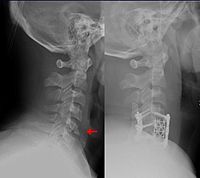
Photo from wikipedia
BACKGROUND Patients undergoing orthopedic surgery are at risk of post-operative complications and needing Medical Emergency Team (MET) review. We assessed the frequency of, and associations with MET calls in orthopedic… Click to show full abstract
BACKGROUND Patients undergoing orthopedic surgery are at risk of post-operative complications and needing Medical Emergency Team (MET) review. We assessed the frequency of, and associations with MET calls in orthopedic patients, and whether this was associated with increased in-hospital morbidity and mortality. METHODS Retrospective cohort study of patients admitted over four years to a University teaching hospital using hospital administrative and MET call databases. RESULTS Amongst 6344 orthopedic patients, 55.8% were female, the median (IQR) age and Charlson comorbidity index were 66 years (47 - 79) and 3 (1 - 5), respectively. Overall, 54.5% of admissions were emergency admissions, 1130 (17.8%) were non-operative, and 605 (9.5%) patients received a MET call. The strongest independent associations with receiving a MET call was the operative procedure, especially hip and knee arthroplasty. Common MET triggers were hypotension (37.5%), tachycardia (25.0%) and tachypnoea (9.1%). Patients receiving a MET call were at increased risk of anemia, delirium, pressure injury, renal failure and wound infection. The mortality of patients who received a MET call was 9.8% compared with 0.8% for those who did not. After adjusting for pre-defined co-variates, requirement for a MET call was associated with an adjusted odd-ratio of 9.57 (95%CI 3.1 - 29.7) for risk of in-hospital death. CONCLUSIONS Approximately 10% of orthopedic patients received a MET call, which was most strongly associated with major hip and knee arthroplasty. Such patients are at increased risk of morbidity and in-hospital mortality. Further strategies are needed to more pro-actively manage at-risk orthopedic patients.
Journal Title: Resuscitation
Year Published: 2020
Link to full text (if available)
Share on Social Media: Sign Up to like & get
recommendations!